【BBC六分钟英语】这是在吵架还是在问路?
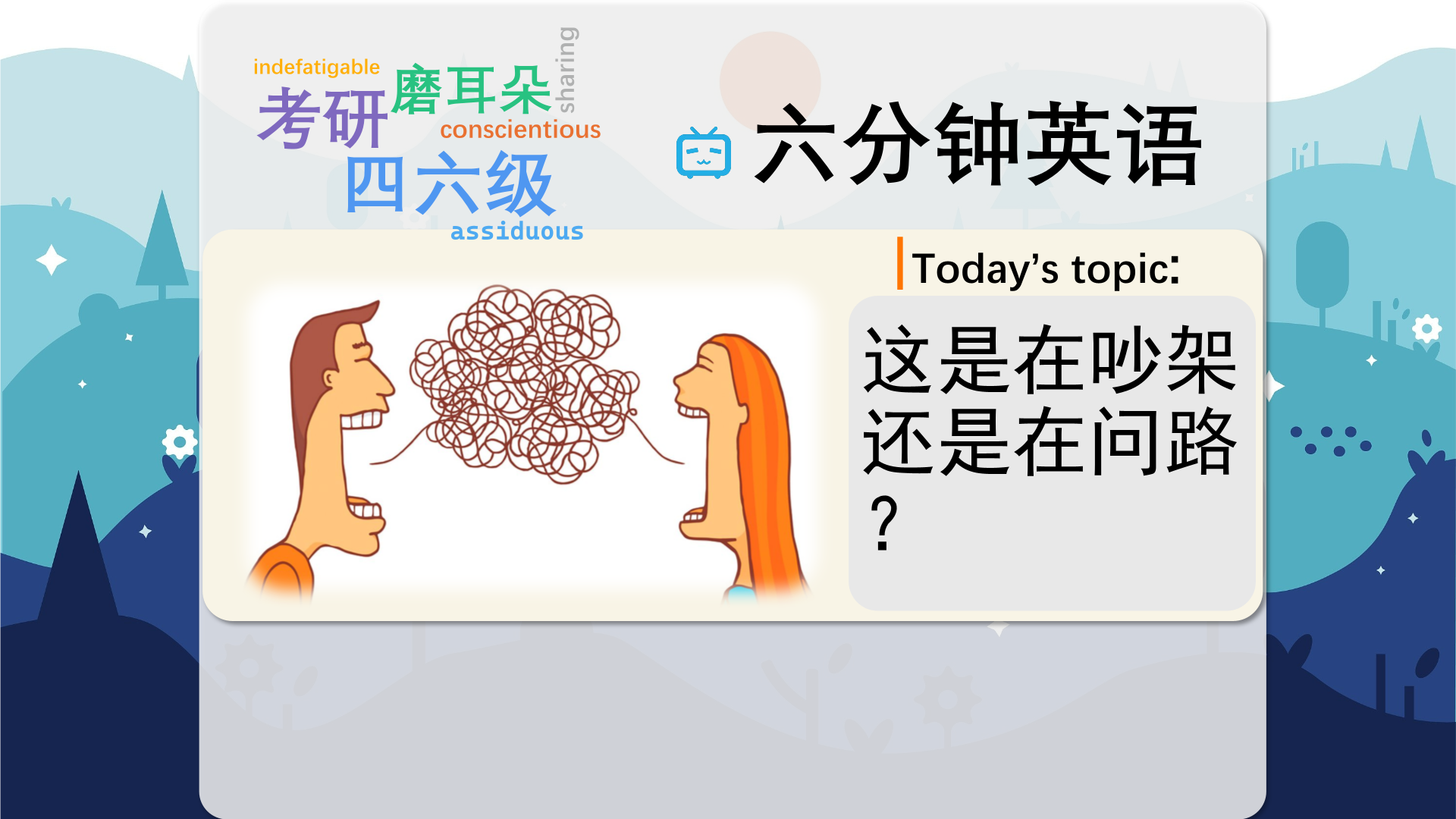
【英文脚本】
Neil
Welcome to 6 Minute English. In this programme we bring you an expressive topic and six items of vocabulary. I’m Neil…
Tim
And I’m Tim. So, we had an argument just before we started the show…
Neil
We did, Tim. But no hard feelings?
Tim
None. No hard feelings is something you say to somebody you have argued with to say you’d still like to be friends. We often fall out over silly things…
Neil
… Like who’s going to introduce the show…
Tim
… Or who’s going to choose the quiz question.
Neil
But we understand each other. That’s the important thing, isn’t it? To fall out with somebody by the way, is another way of saying to argue or disagree with them. Do you know that you wave your arms around a lot when you’re arguing, Tim?
Tim
No, I didn’t know I did that.
Neil
That isn’t very British.
Tim
I know. Using gestures, or movements you make with your hands or your head to express what you are thinking of feeling, is common in some countries but not in others. Then there are some movements, like shaking your head, which mostly means ‘no’ but in some countries can mean the opposite.
Neil
That’s right. In which country does shaking your head mean ‘yes’, Tim? Is it… a) Greece, b) Japan or c) Bulgaria?
Tim
No idea, I’ll guess Greece. I do know that in India people shake their heads to mean lots of different things.
Neil
There are plenty of gestures you need to be careful with when you’re meeting and greeting people from a culture that’s different to your own, to avoid offending people, or making an awkward faux pas…
Tim
If you make a faux pas it means you say or do something embarrassing in a social situation. For example, our every day use of the thumbs-up signal might offend people from the Middle East.
Neil
And to offend means to make somebody angry or upset.
Tim
Let’s hear now from Business Professor Erin Meyer talking about how easy it is to misunderstand why people behave the way they do in everyday situations when we don’t belong to the same culture.
Erin Meyer, Business Professor in Dubai
A while ago I was in Dubai and one of my students, my Emirati students, was driving me home after a session and the car stopped at a light and she rolled down the window, and she started shouting at someone outside of the window. This guy was crossing the street with a big box of cloth. And he started shouting back, and she opened up the door, and they started gesticulating and shouting at one another. And I thought, wow, they’re having a huge fight, I thought maybe he was going to hit her. And she got back in the car, and I said, well, what were you fighting about? And she said, ‘Oh no, no, we weren’t fighting, he was giving me directions to your hotel.’ And I thought that was a great example of how someone from another culture may misperceive or misunderstand something as a fight when in fact they were just being emotionally expressive.
Neil
Gesticulating, what does that mean?
Tim
It means what I was doing earlier!, Waving your arms around to express what you’re feeling.
Neil
Erin Meyer was worried because her student and the man on the street were shouting and gesticulating at each other. She thought they were having a fight when in fact they were just being emotionally expressive.
Tim
And expressive means showing what you think or feel.
Neil
You were nodding in agreement, there, Tim. Which reminds me of our quiz question. In which country does shaking your head mean ‘yes’? Is it… a) Greece, b) Japan or c) Bulgaria?
Tim
I said Greece…
Neil
And that’s the wrong answer, I’m afraid. The right answer is Bulgaria. In some Southeastern European areas such as Bulgaria and southern Albania, shaking your head is used to indicate “yes”. In those regions, nodding in fact means “no” as well.
Tim
I hope I remember that the next time I meet somebody from Southeastern Europe.OK, shall we look back at the words we learned today?
Neil
‘No hard feelings’ is something you say to somebody you have argued with or beaten in a game or contest to say you’d still like to be friends.
Tim
For example, “I always get the quiz questions right, unlike you Neil. But no hard feelings, OK?”
Neil
That’s not a very realistic example, Tim… But I’ll let it go. Number two, ‘to fall out with somebody’ means to argue or disagree with them.
Tim
“I fell out with my best friend at school. We didn’t talk to each other for a whole week!”
Neil
That must’ve been a serious disagreement, Tim! What were you arguing about?
Tim
I can’t remember. It was a long time ago. Number three, a ‘gesture’ is a movement you make with your hands or head to express what you are thinking or feeling.
Neil
“She opened her arms wide in a gesture of welcome.”
Tim
Or the verb, “I gestured to Neil that we only had one minute left to finish the show!”
Neil
Is that true, Tim? You’re nodding your head, but we should also quickly mention ‘gesticulate’ which means to make gestures with your hands or arms!
Tim
A ‘faux pas’ is saying or doing something embarrassing in a social situation. For example, “I committed a serious faux pas at a party last night, that I’m too embarrassed to tell you about!”
Neil
Oh dear, Tim. I hope you didn’t offend too many people, ‘offend’ is our next word, and it means to make somebody angry or upset.
Tim
Well, you’ve given us a good example already, Neil, so let’s move on to the final word, ‘expressive’, which means showing what you think or feel.
Neil
“Tim has a very expressive face.”
Tim
Thanks! Another quick example, “I waved my hand expressively to signal to Neil that it was time to finish the show.”
Neil
Taking my cue from Tim, that’s all for today. But please remember to check out our Instagram, Twitter, Facebook and YouTube pages.
Tim
Bye-bye!
Neil
Goodbye!
【中英文双语脚本】
Neil(尼尔)
Welcome to 6 Minute English. In this programme we bring you an expressive topic and six items of vocabulary. I’m Neil…
欢迎来到 6 Minute English。在这个项目中,我们为您带来一个富有表现力的话题和六个词汇项目。我是 Neil…
Tim(提姆)
And I’m Tim. So, we had an argument just before we started the show…
我是 Tim。所以,我们在开始演出之前发生了争吵……
Neil(尼尔)
We did, Tim. But no hard feelings?
我们做到了,蒂姆。但是没有难受的感觉吗?
Tim(提姆)
None. No hard feelings is something you say to somebody you have argued with to say you’d still like to be friends. We often fall out over silly things…
没有。没有难受的感觉是你对你争论过的人说的话,说你仍然想成为朋友。我们经常因为一些愚蠢的事情而吵架……
Neil(尼尔)
… Like who’s going to introduce the show…
…就像谁来介绍这个节目……
Tim(提姆)
… Or who’s going to choose the quiz question.
…或者谁来选择测验问题。
Neil(尼尔)
But we understand each other. That’s the important thing, isn’t it? To fall out with somebody by the way, is another way of saying to argue or disagree with them. Do you know that you wave your arms around a lot when you’re arguing, Tim?
但我们彼此理解。这很重要,不是吗?顺便说一句,与某人闹翻是另一种说法,即与他们争论或不同意。你知道你吵架时经常挥舞手臂吗,Tim?
Tim(提姆)
No, I didn’t know I did that.
不,我不知道我这样做了。
Neil(尼尔)
That isn’t very British.
这不太英式。
Tim(提姆)
I know. Using gestures, or movements you make with your hands or your head to express what you are thinking of feeling, is common in some countries but not in others. Then there are some movements, like shaking your head, which mostly means ‘no’ but in some countries can mean the opposite.
我知道。使用手势或用手或头做的动作来表达您的感受,在某些国家很常见,但在其他国家/地区并不常见。然后是一些动作,比如摇头,这大多意味着“不”,但在某些国家可能意味着相反。
Neil(尼尔)
That’s right. In which country does shaking your head mean ‘yes’, Tim? Is it… a) Greece, b) Japan or c) Bulgaria?
没错。蒂姆,在哪个国家摇头意味着“是”?是吗。。。a) 希腊,b) 日本还是 c) 保加利亚?
Tim(提姆)
No idea, I’ll guess Greece. I do know that in India people shake their heads to mean lots of different things.
不知道,我猜是希腊。我确实知道,在印度,人们摇头表示许多不同的事物。
Neil(尼尔)
There are plenty of gestures you need to be careful with when you’re meeting and greeting people from a culture that’s different to your own, to avoid offending people, or making an awkward faux pas…
当您与来自不同文化背景的人会面和问候时,您需要小心很多手势,以避免冒犯他人或做出尴尬的失礼……
Tim(提姆)
If you make a faux pas it means you say or do something embarrassing in a social situation. For example, our every day use of the thumbs-up signal might offend people from the Middle East.
如果你犯了失礼,这意味着你在社交场合说或做了一些令人尴尬的事情。例如,我们每天使用竖起大拇指的信号可能会冒犯中东人。
Neil(尼尔)
And to offend means to make somebody angry or upset.
而 to offend 的意思是让某人生气或不安。
Tim(提姆)
Let’s hear now from Business Professor Erin Meyer talking about how easy it is to misunderstand why people behave the way they do in everyday situations when we don’t belong to the same culture.
现在让我们听听商学教授 Erin Meyer 的演讲,当我们不属于同一文化时,人们很容易误解为什么人们在日常生活中会以这种方式行事。
Erin Meyer, Business Professor in Dubai(ErinMeyer,迪拜商学院教授)
A while ago I was in Dubai and one of my students, my Emirati students, was driving me home after a session and the car stopped at a light and she rolled down the window, and she started shouting at someone outside of the window. This guy was crossing the street with a big box of cloth. And he started shouting back, and she opened up the door, and they started gesticulating and shouting at one another. And I thought, wow, they’re having a huge fight, I thought maybe he was going to hit her. And she got back in the car, and I said, well, what were you fighting about? And she said, ‘Oh no, no, we weren’t fighting, he was giving me directions to your hotel.’ And I thought that was a great example of how someone from another culture may misperceive or misunderstand something as a fight when in fact they were just being emotionally expressive.
不久前我在迪拜,我的一个学生,我的阿联酋学生,在一次课程结束后开车送我回家,车停在红绿灯处,她摇下车窗,开始对窗外的人大喊大叫。这家伙拿着一大箱布过马路。他开始大喊大叫,她打开了门,他们开始互相打手势和大喊大叫。我想,哇,他们大吵一架,我想也许他会打她。她回到车里,我说,嗯,你在为什么吵架?’她说,’哦,不,不,我们没有打架,他是在给我指路去你的酒店。我认为这是一个很好的例子,说明来自另一种文化的人可能会误解或误解某事是一场战斗,而实际上他们只是在表达情感。
Neil(尼尔)
Gesticulating, what does that mean?
打手势,这是什么意思?
Tim(提姆)
It means what I was doing earlier!, Waving your arms around to express what you’re feeling.
它的意思是我之前在做的事情!挥舞你的手臂来表达你的感受。
Neil(尼尔)
Erin Meyer was worried because her student and the man on the street were shouting and gesticulating at each other. She thought they were having a fight when in fact they were just being emotionally expressive.
艾琳·迈耶 (Erin Meyer) 很担心,因为她的学生和街上的那个男人都在大喊大叫,互相打手势。她以为他们在吵架,而实际上他们只是在表达情感。
Tim(提姆)
And expressive means showing what you think or feel.
而富有表现力的意思是展示你的想法或感受。
Neil(尼尔)
You were nodding in agreement, there, Tim. Which reminds me of our quiz question. In which country does shaking your head mean ‘yes’? Is it… a) Greece, b) Japan or c) Bulgaria?
你点头同意,Tim。这让我想起了我们的测验问题。在哪个国家/地区,摇头的意思是“是”?是吗。。。a) 希腊,b) 日本还是 c) 保加利亚?
Tim(提姆)
I said Greece…
我说希腊……
Neil(尼尔)
And that’s the wrong answer, I’m afraid. The right answer is Bulgaria. In some Southeastern European areas such as Bulgaria and southern Albania, shaking your head is used to indicate “yes”. In those regions, nodding in fact means “no” as well.
恐怕这是错误的答案。正确的答案是保加利亚。在一些东南欧地区,如保加利亚和阿尔巴尼亚南部,摇头用于表示“是”。在这些地区,点头实际上也意味着“不”。
Tim(提姆)
I hope I remember that the next time I meet somebody from Southeastern Europe.OK, shall we look back at the words we learned today?
我希望我记得,下次我遇到来自东南欧的人时,好吗,我们回顾一下我们今天学到的单词吗?
Neil(尼尔)
‘No hard feelings’ is something you say to somebody you have argued with or beaten in a game or contest to say you’d still like to be friends.
“没有难受的感觉”是你对你争论过或在游戏或比赛中被击败的人说的话,表明你仍然想成为朋友。
Tim(提姆)
For example, “I always get the quiz questions right, unlike you Neil. But no hard feelings, OK?”
例如,“我总是把测验问题做对,不像你 Neil。但不要难受,好吗?
Neil(尼尔)
That’s not a very realistic example, Tim… But I’ll let it go. Number two, ‘to fall out with somebody’ means to argue or disagree with them.
这不是一个非常现实的例子,蒂姆……但我会放手。第二点,“与某人闹翻”的意思是与他们争论或不同意他们。
Tim(提姆)
“I fell out with my best friend at school. We didn’t talk to each other for a whole week!”
“我在学校和我最好的朋友闹翻了。我们整整一个星期都没说话!
Neil(尼尔)
That must’ve been a serious disagreement, Tim! What were you arguing about?
这一定是一个严重的分歧,蒂姆!你们在争论什么?
Tim(提姆)
I can’t remember. It was a long time ago. Number three, a ‘gesture’ is a movement you make with your hands or head to express what you are thinking or feeling.
我记不清了。那是很久以前的事了。第三,“手势”是您用手或头做出的动作,以表达您的想法或感受。
Neil(尼尔)
“She opened her arms wide in a gesture of welcome.”
“她张开双臂表示欢迎。”
Tim(提姆)
Or the verb, “I gestured to Neil that we only had one minute left to finish the show!”
或者动词,“我向 Neil 示意我们只剩下一分钟来完成演出了!
Neil(尼尔)
Is that true, Tim? You’re nodding your head, but we should also quickly mention ‘gesticulate’ which means to make gestures with your hands or arms!
这是真的吗,蒂姆?你在点头,但我们也应该快速提到 ‘gesticulate’,意思是用你的手或手臂做手势!
Tim(提姆)
A ‘faux pas’ is saying or doing something embarrassing in a social situation. For example, “I committed a serious faux pas at a party last night, that I’m too embarrassed to tell you about!”
“失礼”是指在社交场合说或做一些令人尴尬的事情。例如,“我昨晚在派对上犯了一个严重的失礼,我不好意思告诉你!
Neil(尼尔)
Oh dear, Tim. I hope you didn’t offend too many people, ‘offend’ is our next word, and it means to make somebody angry or upset.
哦,天哪,蒂姆。我希望你没有冒犯太多人,“冒犯”是我们的下一个词,它的意思是让某人生气或不安。
Tim(提姆)
Well, you’ve given us a good example already, Neil, so let’s move on to the final word, ‘expressive’, which means showing what you think or feel.
好吧,Neil,你已经给了我们一个很好的例子,那么让我们继续讨论最后一个词,“expressive”,意思是展示你的想法或感受。
Neil(尼尔)
“Tim has a very expressive face.”
“蒂姆有一张非常富有表现力的脸。”
Tim(提姆)
Thanks! Another quick example, “I waved my hand expressively to signal to Neil that it was time to finish the show.”
谢谢!另一个简单的例子是,“我富有表现力地挥了挥手,向 Neil 示意,是时候结束演出了。
Neil(尼尔)
Taking my cue from Tim, that’s all for today. But please remember to check out our Instagram, Twitter, Facebook and YouTube pages.
从 Tim 那里得到提示,这就是今天的全部内容。但请记得查看我们的 Instagram、Twitter、Facebook 和 YouTube 页面。
Tim(提姆)
Bye-bye!
再见!
Neil(尼尔)
Goodbye!
再见!

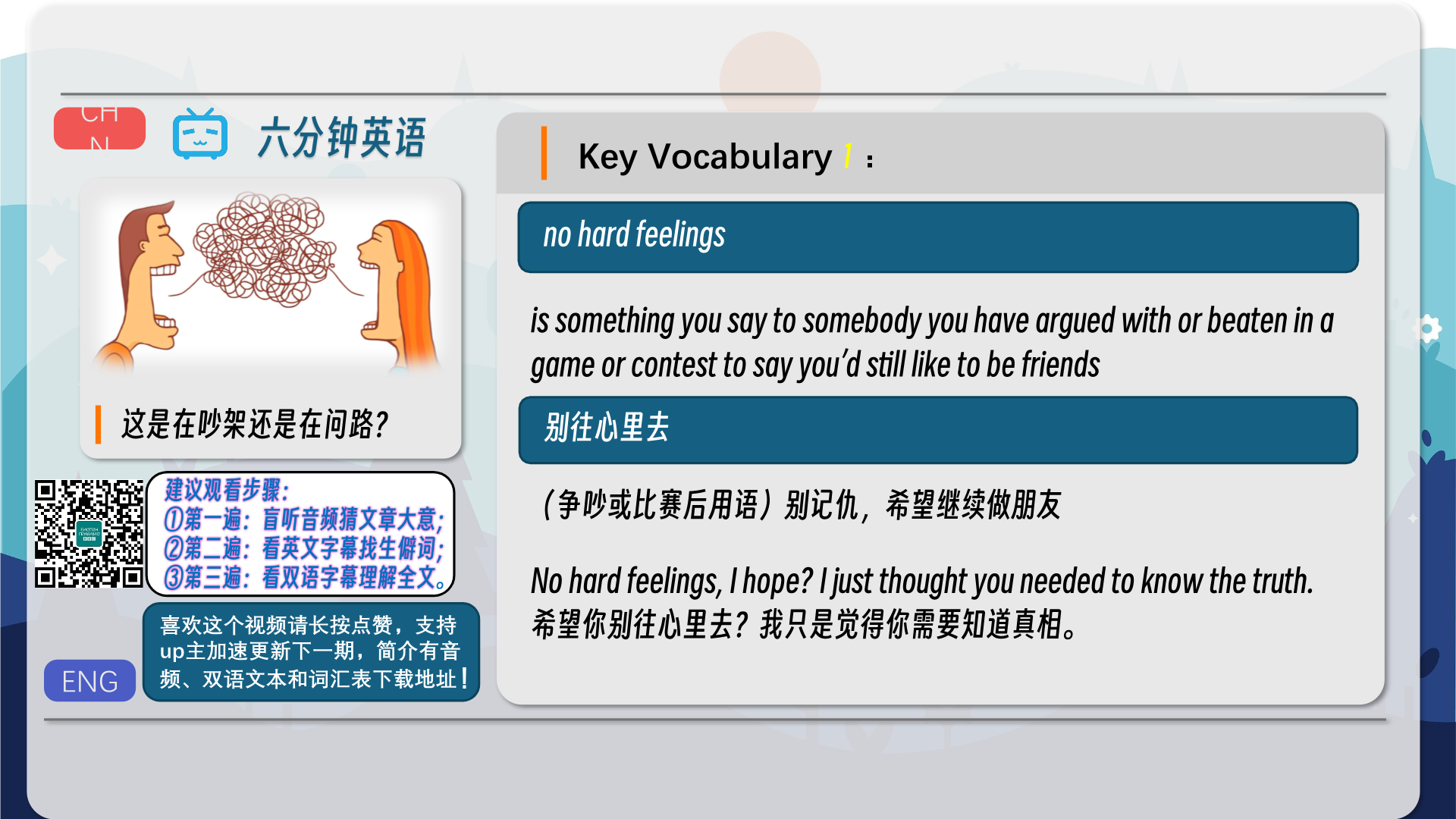
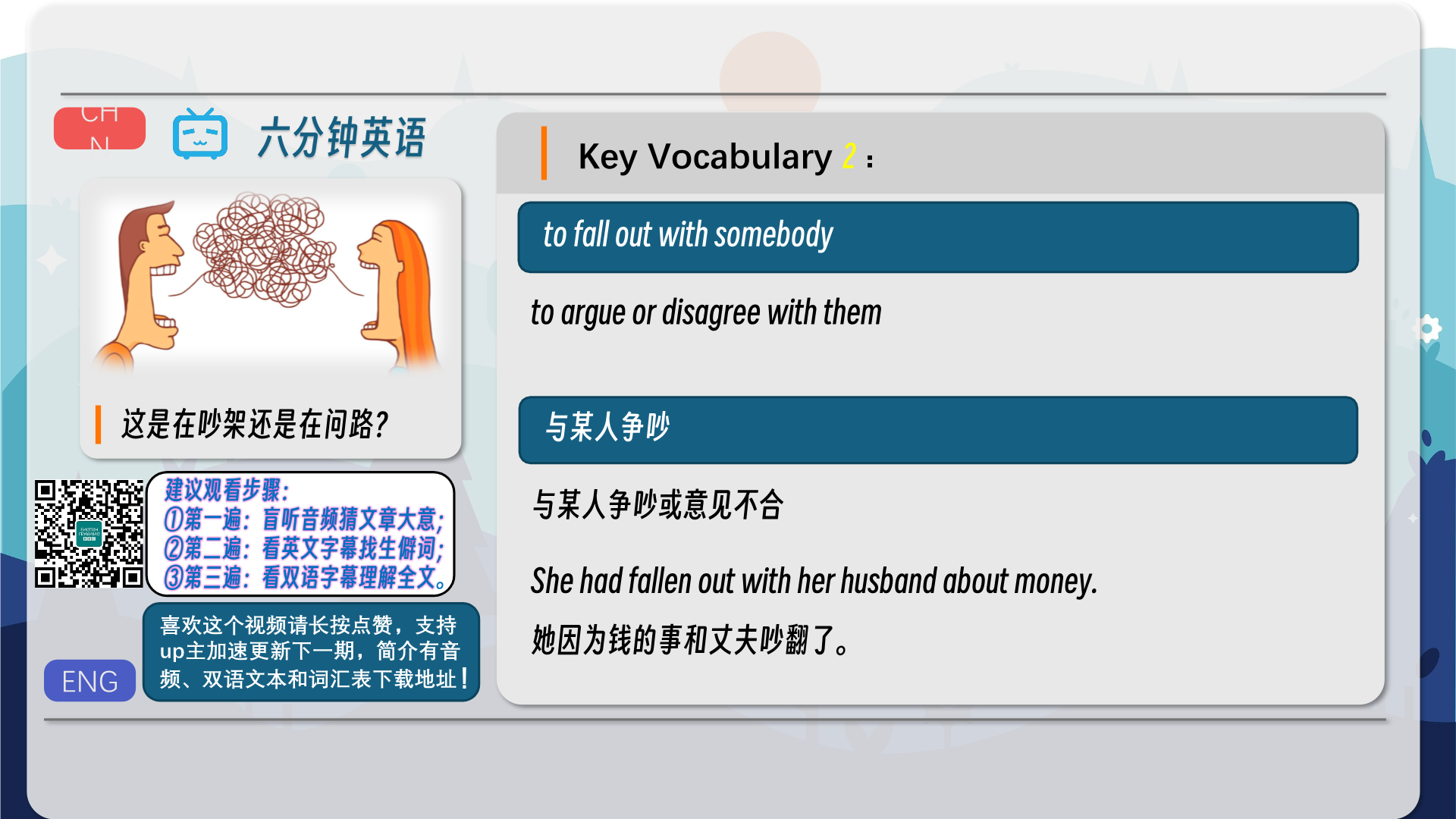
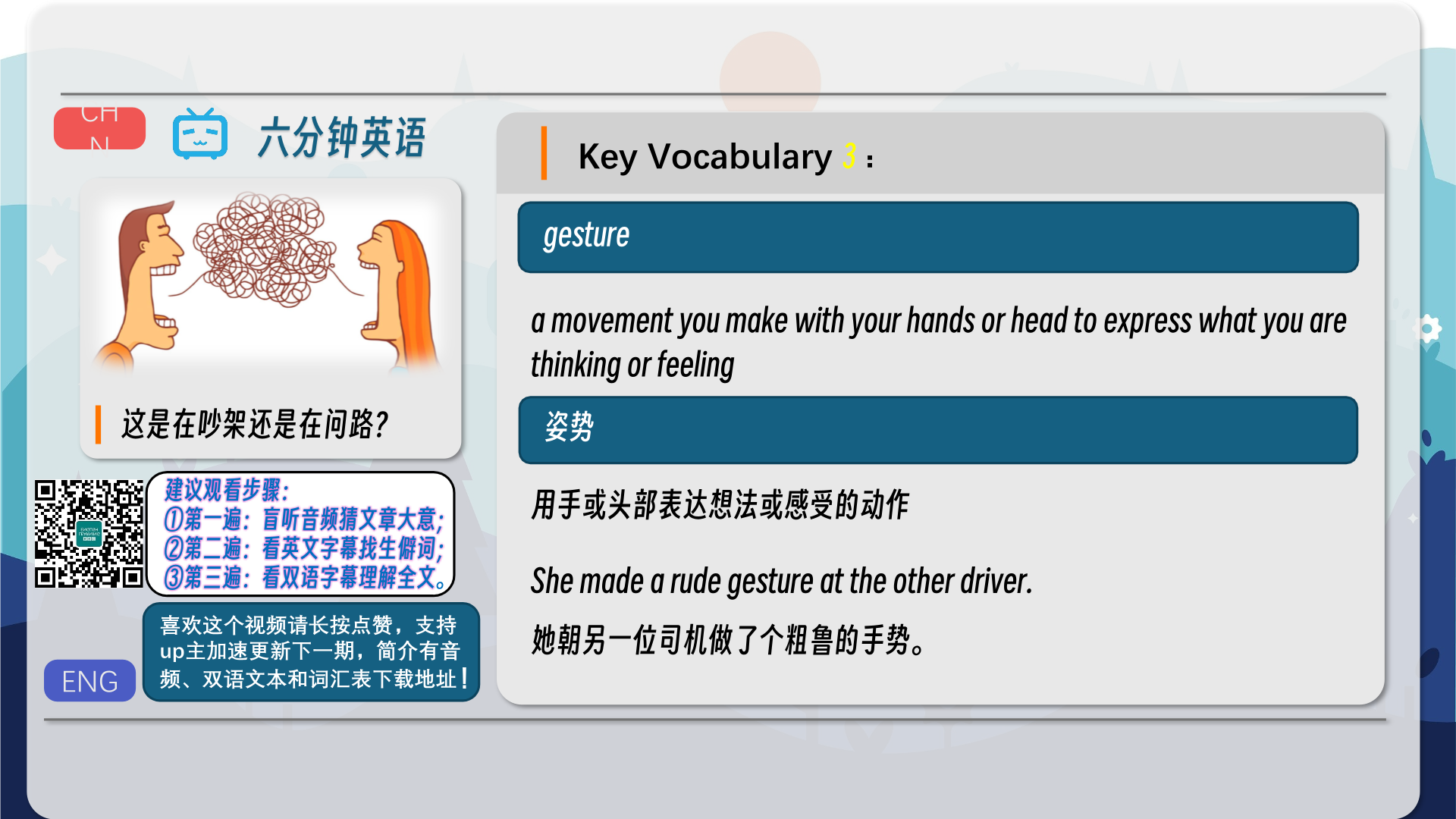
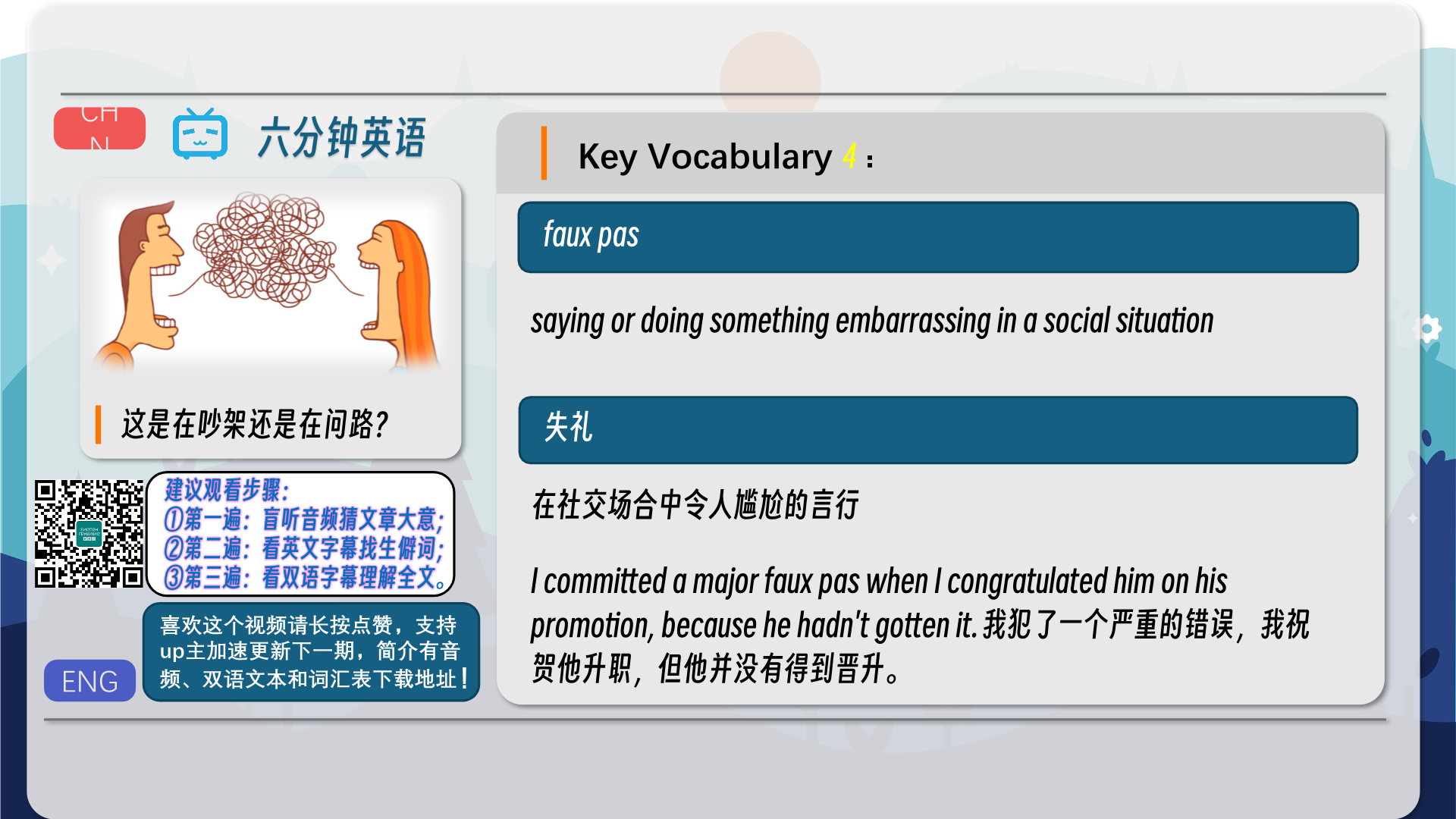
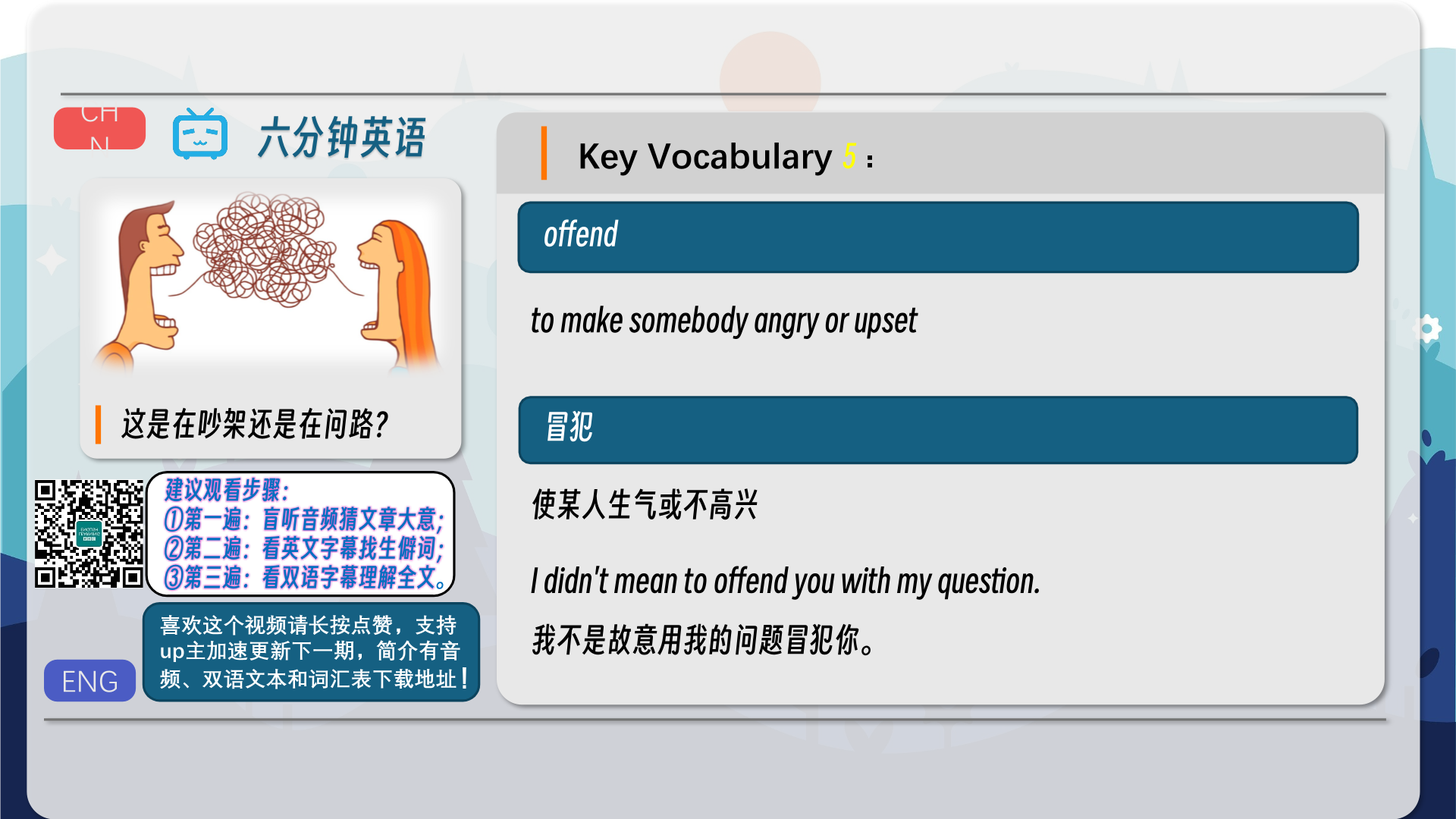
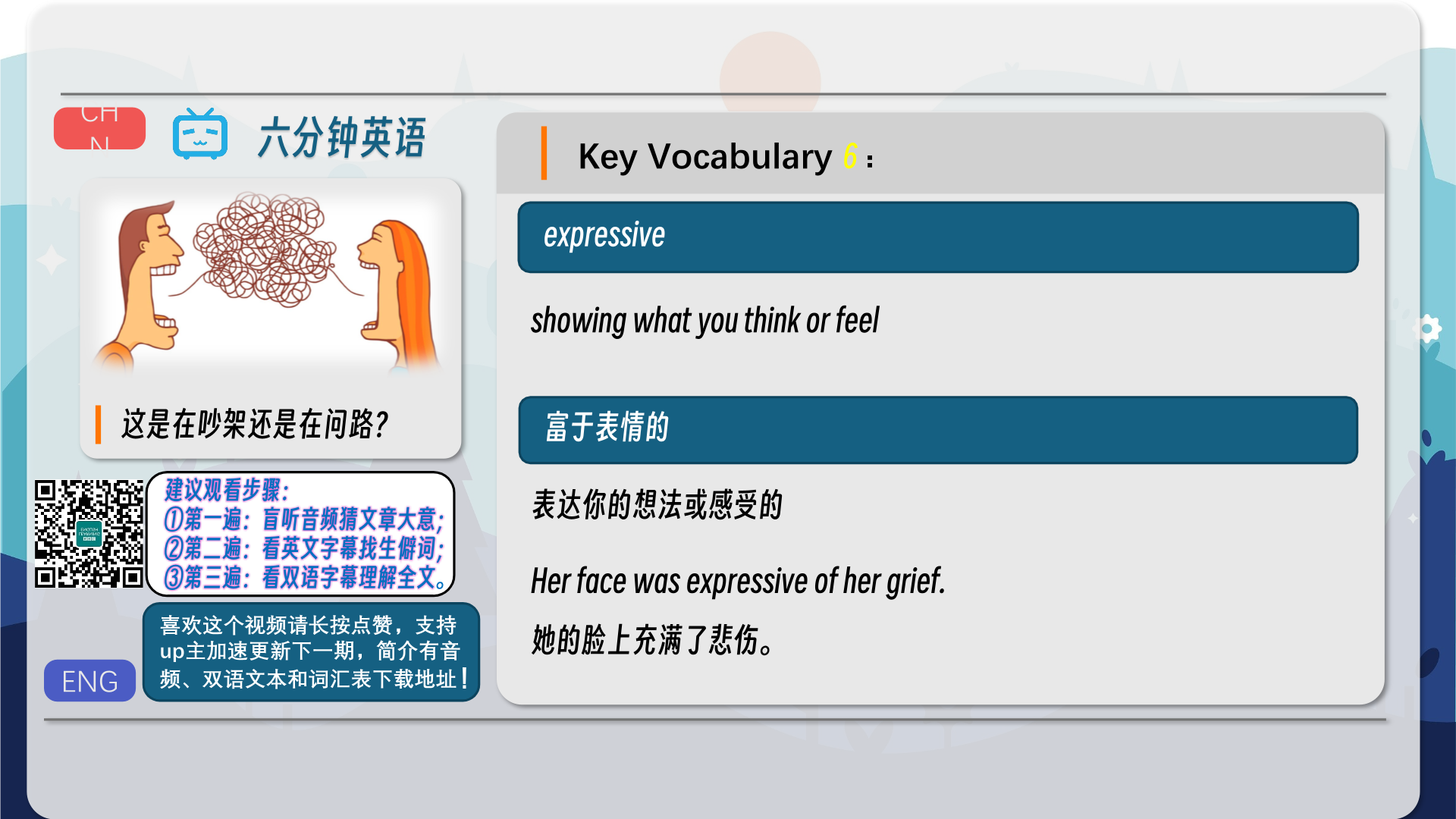
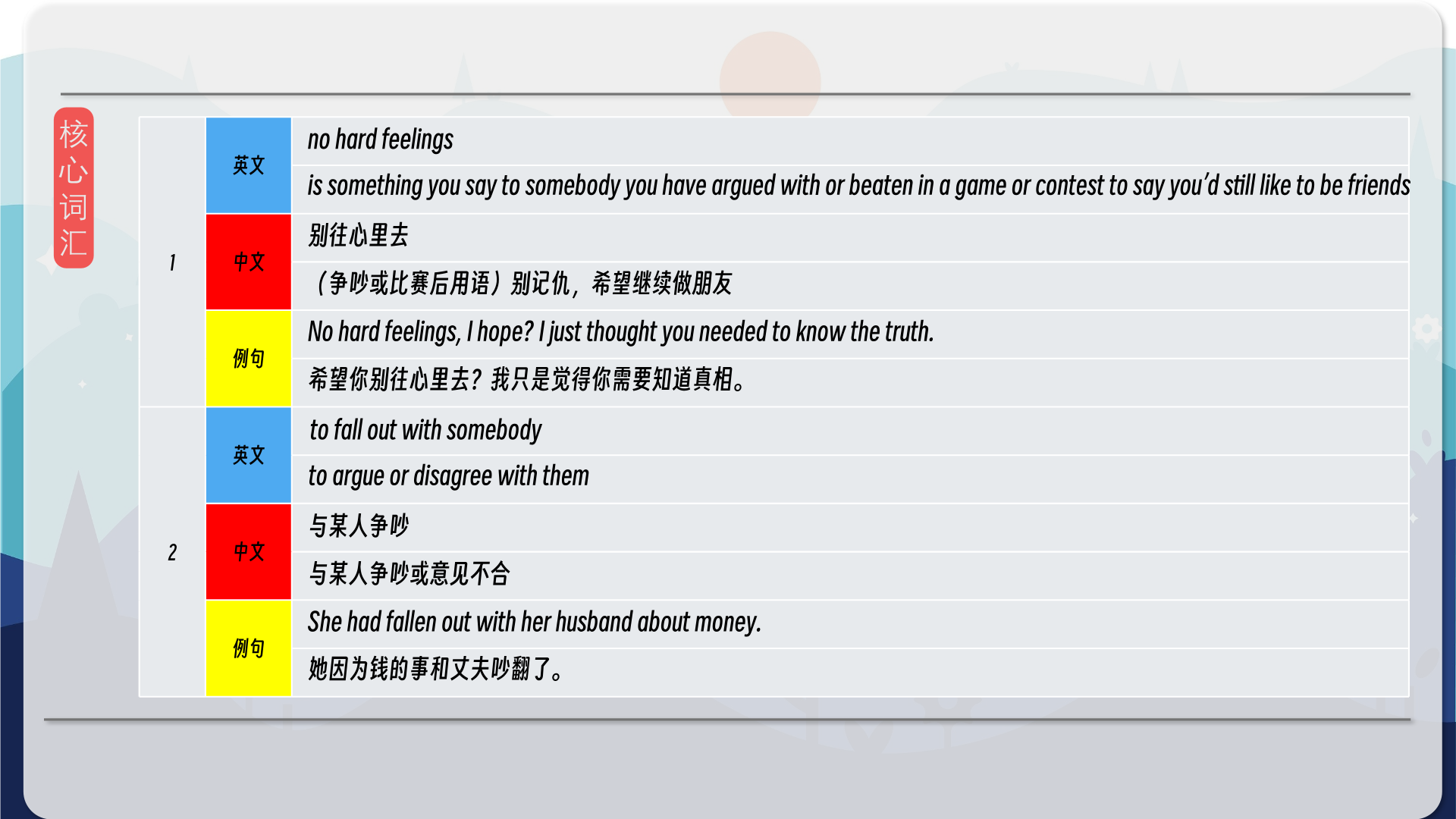
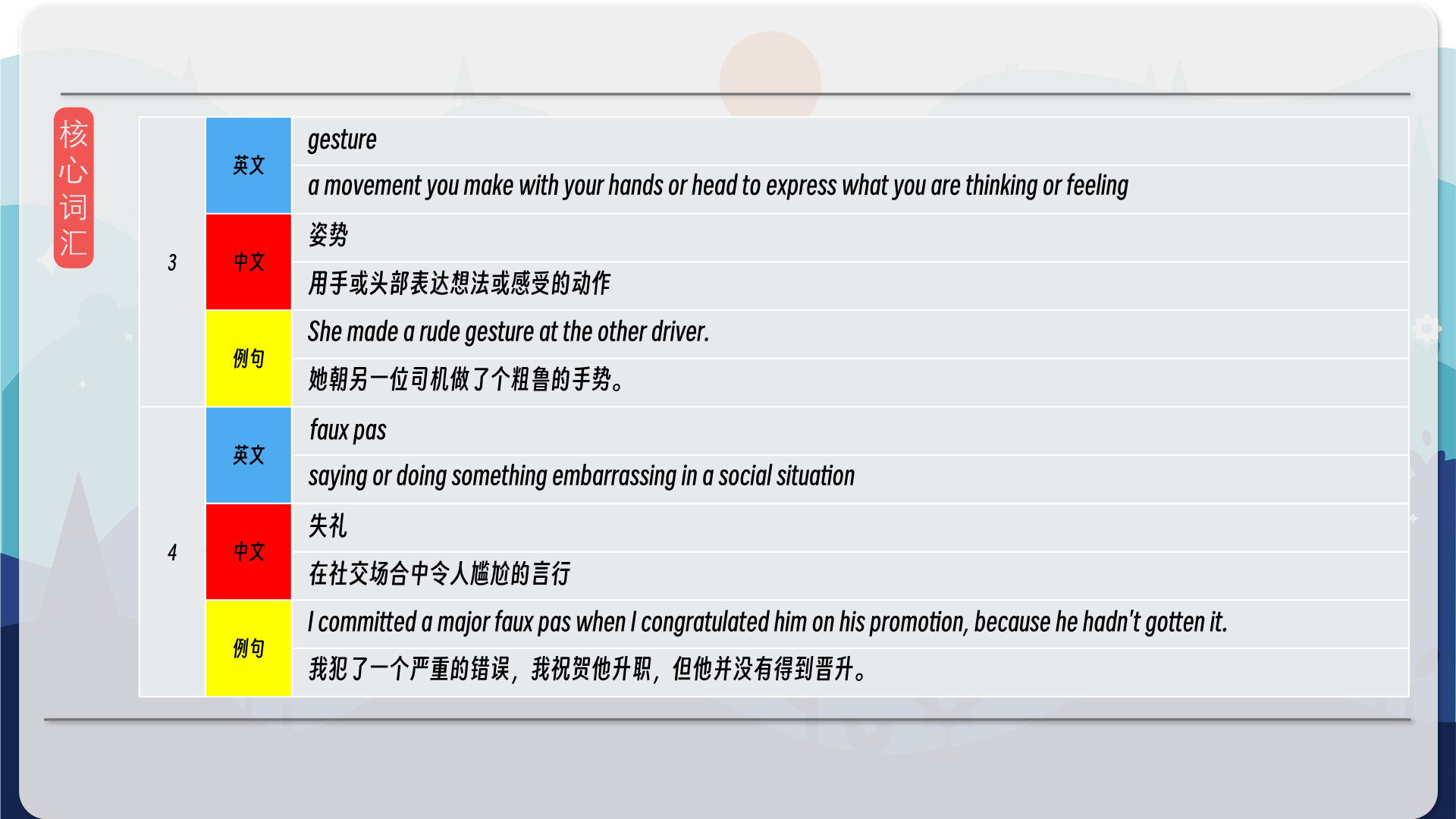
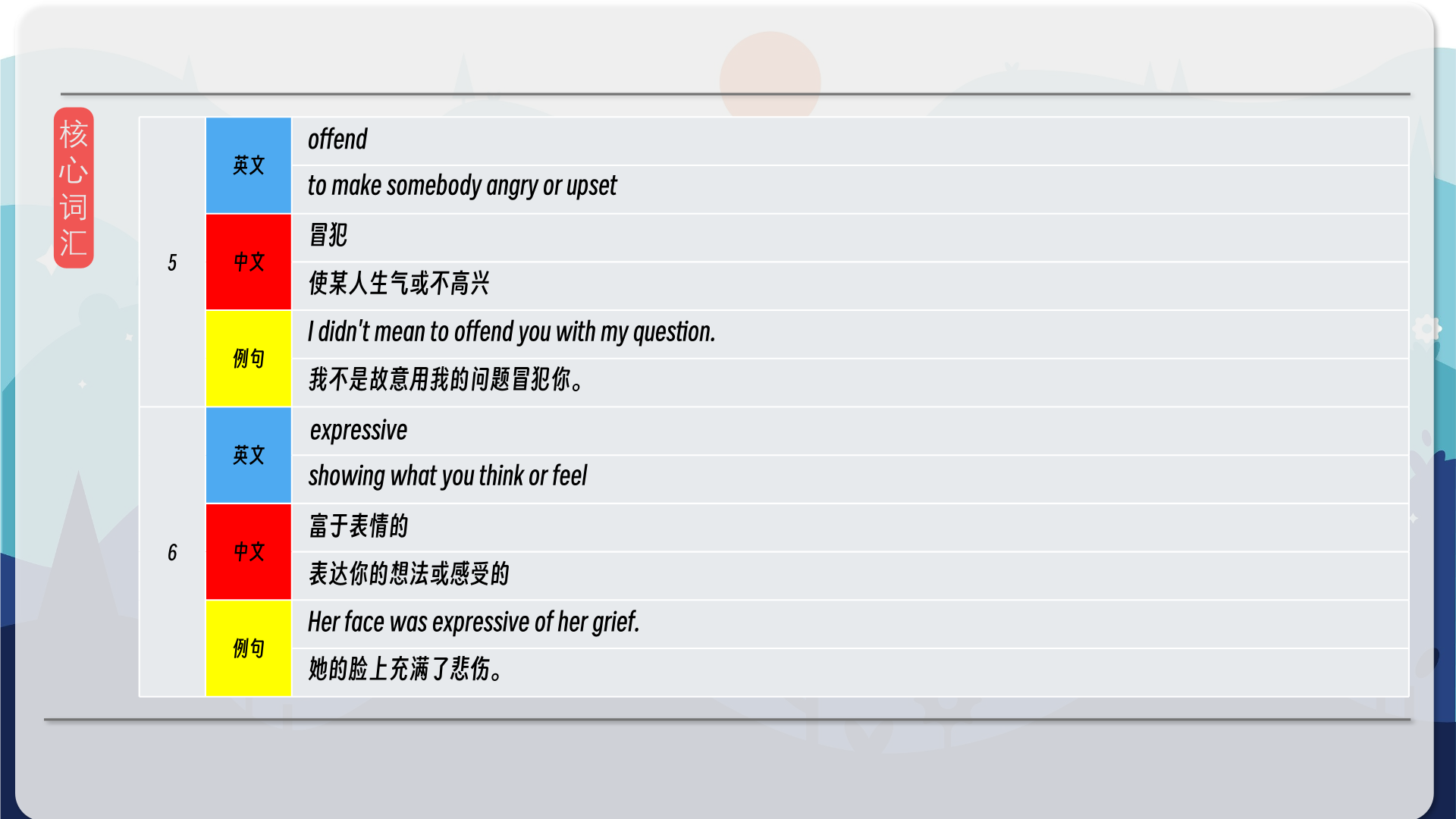
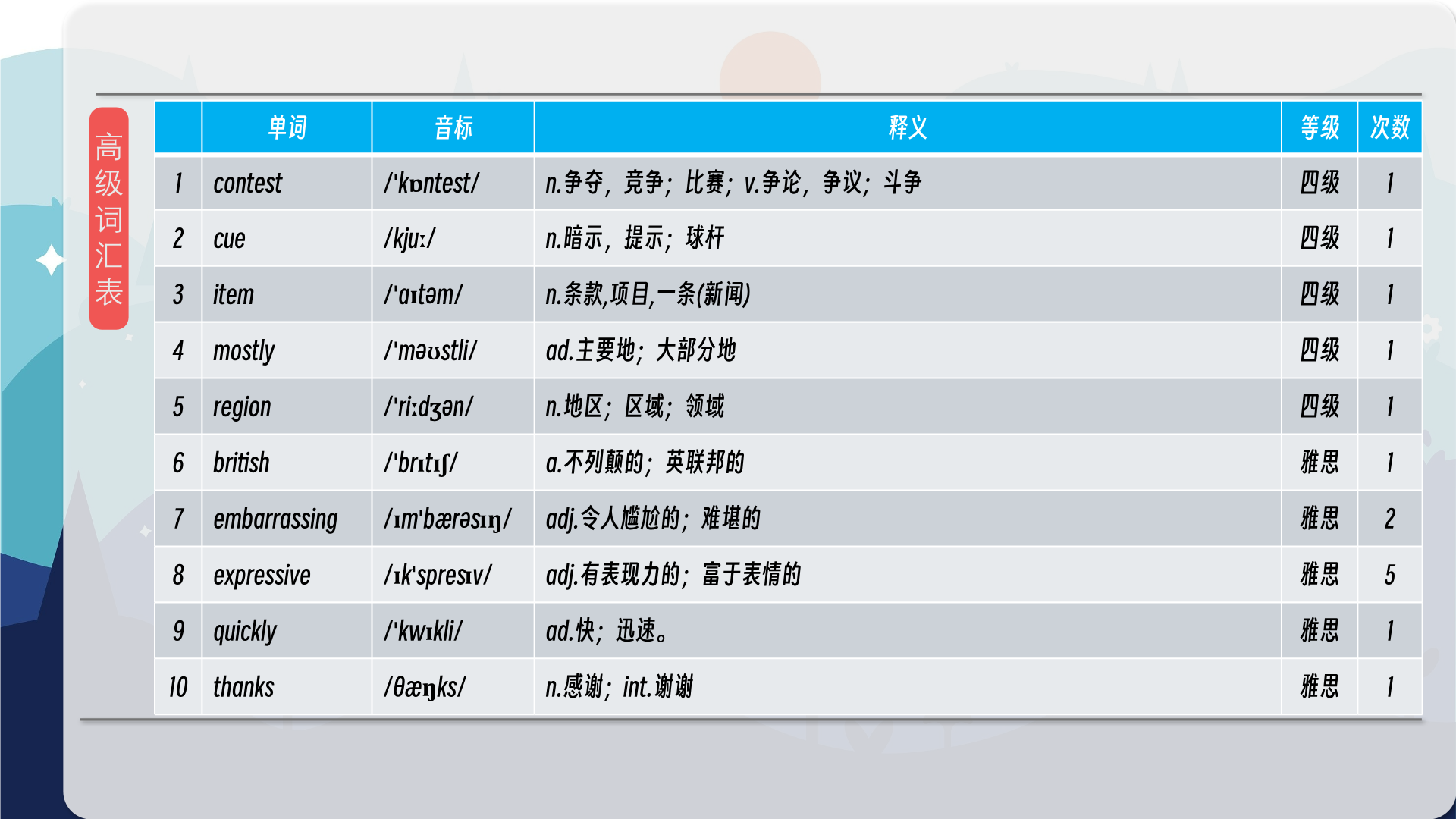

【核心词汇】
no hard feelings
is something you say to somebody you have argued with or beaten in a game or contest to say you’d still like to be friends
别往心里去
(争吵或比赛后用语)别记仇,希望继续做朋友
No hard feelings, I hope? I just thought you needed to know the truth.
希望你别往心里去?我只是觉得你需要知道真相。
to fall out with somebody
to argue or disagree with them
与某人争吵
与某人争吵或意见不合
She had fallen out with her husband about money.
她因为钱的事和丈夫吵翻了。
gesture
a movement you make with your hands or head to express what you are thinking or feeling
姿势
用手或头部表达想法或感受的动作
She made a rude gesture at the other driver.
她朝另一位司机做了个粗鲁的手势。
faux pas
saying or doing something embarrassing in a social situation
失礼
在社交场合中令人尴尬的言行
I committed a major faux pas when I congratulated him on his promotion, because he hadn’t gotten it.
我犯了一个严重的错误,我祝贺他升职,但他并没有得到晋升。
offend
to make somebody angry or upset
冒犯
使某人生气或不高兴
I didn’t mean to offend you with my question.
我不是故意用我的问题冒犯你。
expressive
showing what you think or feel
富于表情的
表达你的想法或感受的
Her face was expressive of her grief.
她的脸上充满了悲伤。
在公众号里输入6位数字,获取【对话音频、英文文本、中文翻译、核心词汇和高级词汇表】电子档,6位数字【暗号】在文章的最后一张图片,如【220728】,表示22年7月28日这一期。公众号没有的文章说明还没有制作相关资料。年度合集在B站【六分钟英语】工房获取,每年共计300+文档,感谢支持!